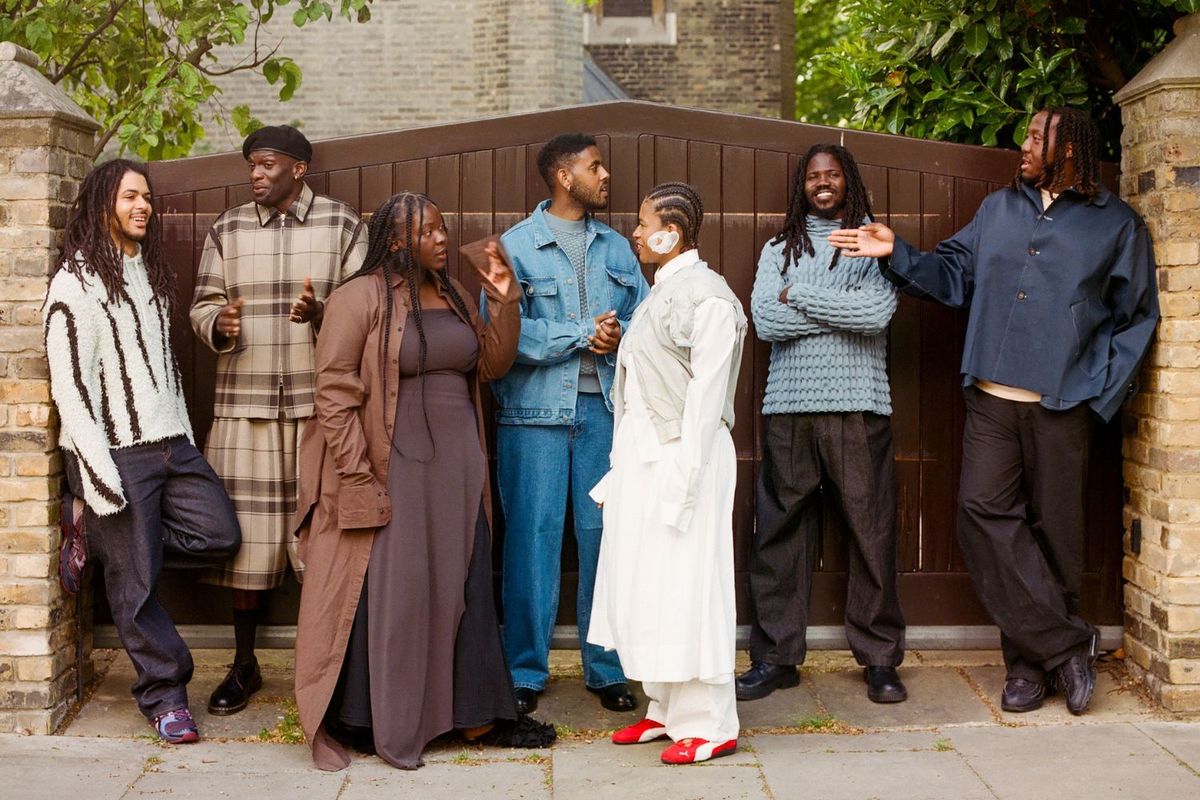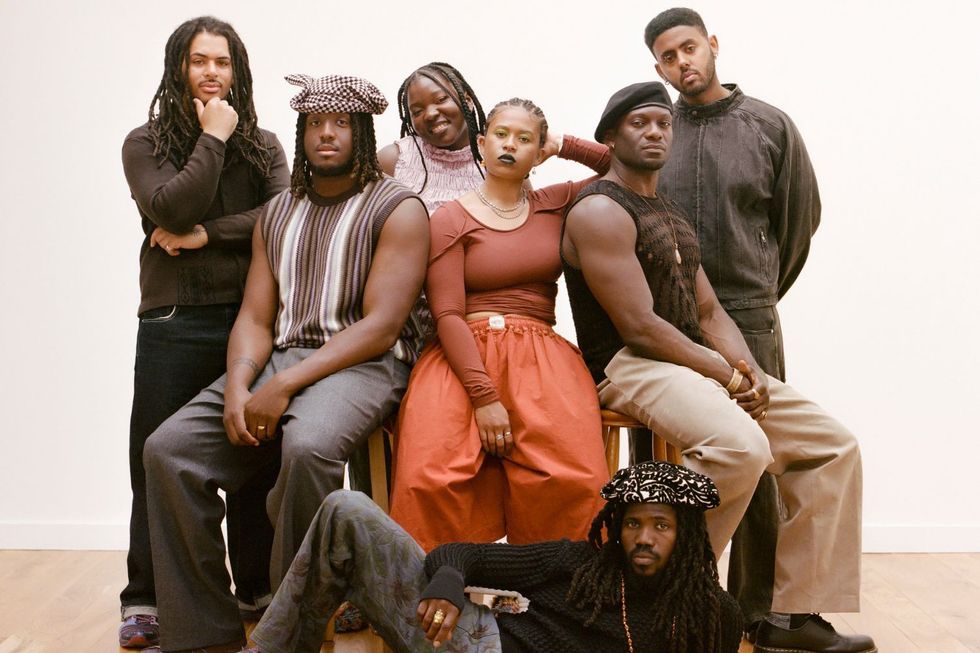How Kokoroko’s ‘Tuff Times Never Last’ Turned a Meme into a Musical Healing Mantra
The band's new album pulls humor, heartbreak, and harmony into one of their most confident and emotionally expansive works yet.

Kokorko’s new album, Tuff Time Never Last, is their most experimental yet.
A meme circulated widely during the early days of the COVID-19 lockdown. In it, a man in a brown jacket and plaid shirt films himself at what looks like a luxurious resort – or maybe his house – panning across a large swimming pool. "Tough times [sic] never last, only tough people last," he declares, then wags his tongue and lets out a truly astonishing sound.
Kokoroko's new album, Tuff Times Never Last, draws on the carefree spirit of that video. It's a nod to nostalgia, levity, and endurance. On the opener "Never Lost," Tobi Adenaike-Johnson runs the length of his fretboard with a sound reminiscent of the video's wild final seconds.
The pandemic struck just as Kokoroko were cresting the wave of "Abusey Junction," a gentle, hypnotic track that first appeared on Brownswood Recordings' We Out Here compilation in 2018. That song placed them at the heart of a global jazz movement connecting London, Johannesburg, and Chicago, and launched them into opportunities they hadn't imagined.
"It was happening so quick for us," says trumpeter, flugelhornist, and vocalist Sheila Maurice-Grey, who formed the band after meeting percussionist Onome Edgeworth on an arts trip to Kenya. "It was a bit of a surreal moment, and it took a while for it to sink in. From that, we got so many opportunities. 2019 is the most we've toured."
Cape Town was also on the cards, until lockdown rules put those plans on hold. But they eventually made it. At last year's Cape Town International Jazz Festival, Kokoroko performed on the Mannenberg stage to a packed audience, city lights glowing and cars rushing past on the highway above.
"[We were] hearing people singing our songs better than us, people singing in three-part harmony, it was crazy," Maurice-Grey recalls. Some band members stayed behind to soak up the vibe in the meme's country of origin. "It's a real feeling, very contagious. It wasn't just in the show. People love music in general, not just our music."
On their 2019 self-titled debut EP, Kokoroko wove Afrobeats, highlife, soul, funk, and jazz into something both uplifting and bold. Songs like "Ti-de" stretched their melodic ambitions, while "Adwa" revealed their knack for lush horn arrangements and infectious rhythm.
Tuff Times Never Last extends those foundations while exploring new ground. "Sweetie" feels like summer – buoyant, warm, and confident. It captures a band more confident in themselves, more aligned and freer than ever before. This is their second full-length album, following 2022's vibrant Could We Be More, and its 2023 remix edition.
"We played two songs from the album at the Cape Town show," says Edgeworth. "For us, testing songs and playing them in front of people [is a unique experience]. We get to see their expressions change from confused to like, either they buy into it, or they don't. And it's a beautiful way to learn about a song. We were falling in love with the album at that point."
He continues: "I think a lot of us in the band communicate more through memes than through actual texts and conversations. You know that you have friends to whom you can send anything, and only those people would get it. It's a way of reinforcing and talking to little parts of your relationship that might have been harder for a moment before. I think that connection is very important in music. I know that if I do something, maybe someone will react, and if I do something else, it'll get someone else's attention. And that keeps the music fresh and fun. Without those micro-connections, whether through memes or through actually playing, it gets very boring and repetitive. It's a beautiful thing."
The album's title came later. "We had a few titles. They were nice titles, to be fair. But they were just nice," says Maurice-Grey. It was Edgeworth who suggested Tuff Times Never Last. Though initially hesitant, she quickly came around. "It actually made sense. It's so true of many things happening in our personal lives and the world. The music we're trying to make is tough times never last. It's straight to the point, it means so much," she says. Edgeworth adds that the phrase is "something we follow and live with. It's the real thing."

Tuff Time Never Last was one of many titles. It ended up sticking.
Photo by Kemka Ajoko
The album touches on themes of community love ("Sweetie"), longing and intimacy ("Closer To Me", "Idea 5"), and generational heritage ("Three Piece Suit"). The features are intentional, honed through years of refining their sound and pushing themselves. The line-up is completed by Anoushka Nanguy (trombone/vocals), Tobi Adenaike (guitar/vocals), Yohan Kebede (keyboards/synthesizers/vocals), Duane Atherley (bass, vocals), Ayo Salawu (drums, vocals), and special guest Chelsea Carmichael on tenor saxophone, bass clarinet, and flute.
"Call my name, just one more time / the light has changed, but you're still mine," LULU sings on "Idea 5," her voice translucent, affectionate, and endearing. On "Time and Time Again," Demae stretches the metaphor further: "Time and time we've tried to get through / and even when it falls apart, I know that it's with you."
Personal and collective experience permeate the record. Themes of togetherness, duality, childhood, and loss give the music its deeply human texture. "We spend a lot of time together, especially when we're recording or writing," Edgeworth explains.
The band often rents a house to write, allowing the personal to blend with the communal. "You get the true person. Sometimes they wake from good days and bad days, some days you're reminiscing and you get a text from home, or you're arguing with your girl or your guy. The beauty of having seven people is that you get this full context of human beings at all times; there's always a spectrum. It brings phrases like the album title, just different sounds and energies are always present in our music. Those energies are key for us to maintain and push forward at all times," Edgeworth concludes.

